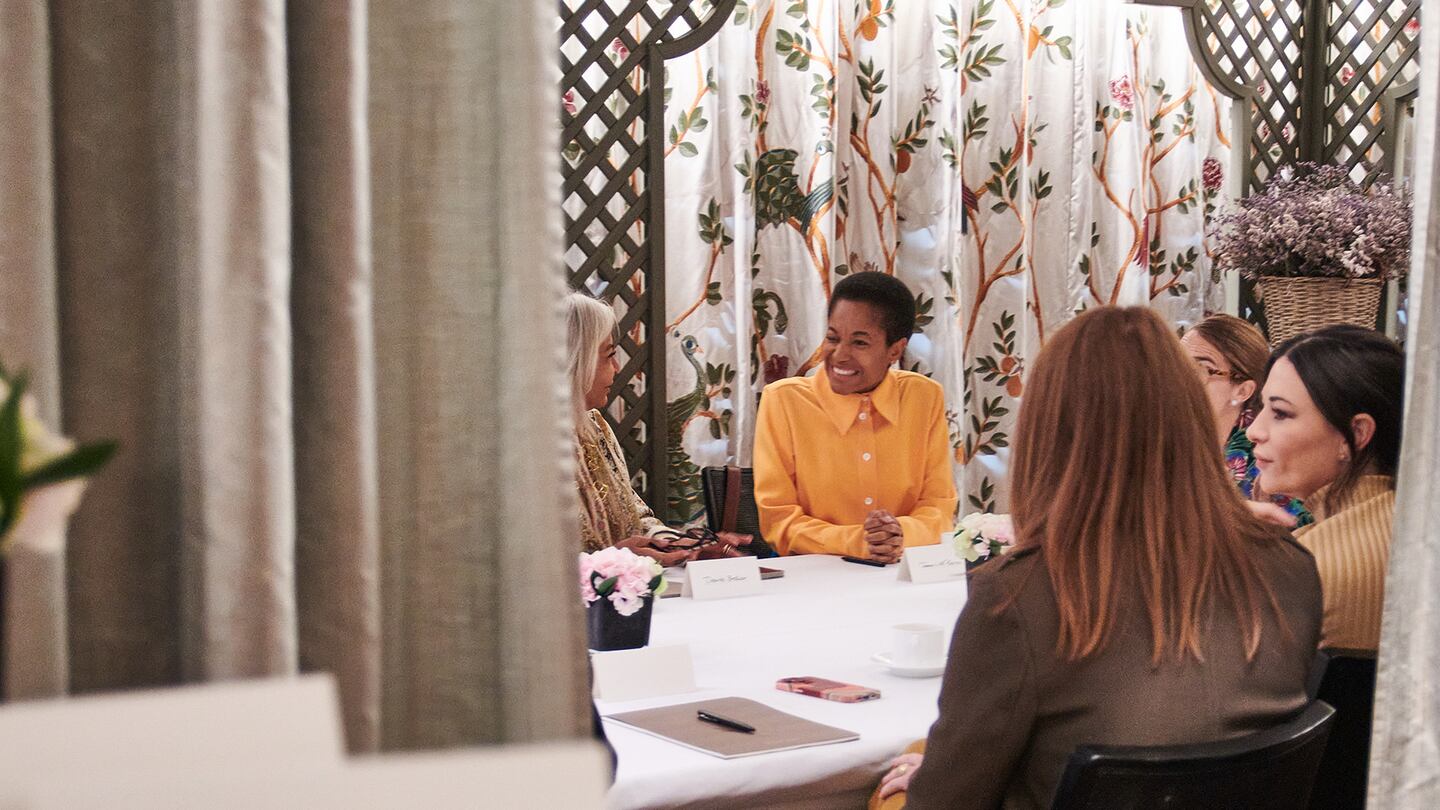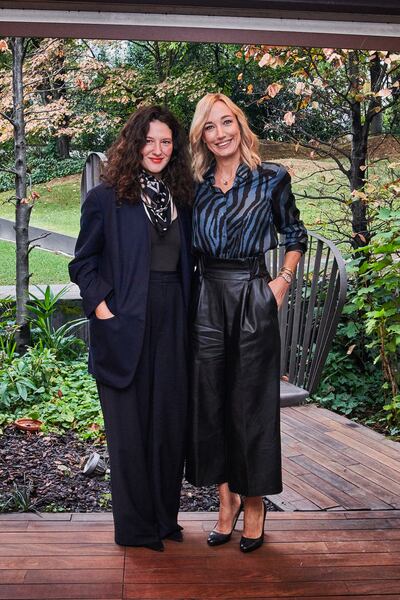
The Business of Fashion
Agenda-setting intelligence, analysis and advice for the global fashion community.

Agenda-setting intelligence, analysis and advice for the global fashion community.

On September 25, the Sunday of Milan Fashion Week’s spring/summer 2023 shows, leaders from across fashion, luxury and jewellery industries met at the Bulgari Hotel for a roundtable discussion on how the industry can better empower its female-identifying workforce.
Conducted under the Chatham House Rule, attendees shared their views on the power of external activations and activism before discussing the role leadership and people strategies play in female empowerment. The conversation rounded out on the topic of supporting women in the supply chain and ensuring social welfare within the global industry.

The event was co-hosted by Laura Burdese, marketing and communication vice president at Bulgari who, together with the maison’s creative director Lucia Silvestri, is part of the 62 percent of women with global managerial positions in the company.
The Roman luxury jewellery house’s efforts in female empowerment include a series of global activations including its Aurora Awards, established in 2016 to celebrate women in their field of work, or fostering the female scientific talents of the future through the support to The Rockefeller University, establishing the Bulgari Women & Science Fellowship in Covid-19 Research.
An LVMH maison, Bulgari’s efforts contribute towards the conglomerate’s improved gender parity work. Between 2007 and 2021, the percentage of women in key positions at LVMH rose from 23 percent to 44 percent, with the Group achieving a Gender Equality Index score of 92/100 in France in 2021. This score is based on five criteria: wage gaps, pay rise differences, promotion discrepancies, the percentage of employees given a pay rise on returning from maternity leave, and the number of women in the top 10 highest-paying jobs.
However, while individual company efforts, national laws and increased social pressure seek to improve gender equality, discrepancies still prevail both within and outside global companies. Europe leads the major markets in cis-female representation on boards, but its representation of executive and managerial levels are not much improved. For instance, market watchdog Consob revealed female CEOs headed only 2.5 percent of total market capitalisation on the Milan stock exchange.
Despite the stubbornness of prevailing inequity, McKinsey & Co. reports companies in the top quartile for gender diversity on executive teams are 21 percent more likely to outperform on profitability and 27 percent more likely to have superior value creation.
Now, BoF shares some key insights and learnings from the topics covered by the global leaders in attendance, from the likes of Moda Operandi, OTB, New Guards Group, Moncler, and Hearst UK.
External Support for Women: Activations and Activism
The luxury and fashion industries are no stranger to acting as a mouthpiece for women’s rights, from retailers like Net-a-Porter releasing capsule collections for International Women’s Day, to brands like Victoria Secret embracing greater representation of women on its runway, with new front women including a soccer star Megan Rapino and plus-size model Paloma Elsesser.
Indeed, as more companies embrace stances in support of social welfare and justice movements, the need to back-up public statements with authentic business practice is crucial — both for consumers for authentic brand alignment, but also for recruitment and retention within.
“The reason why I chose to work for [my company] is that they truly believe [in female empowerment] every day, and as a duty, we have to push for it,” said one attendee, while another shared a story of a colleague’s decision to leave a job that did not provide suitable facilities for breastfeeding.
What’s more, only 23 percent of female employees believe their employers are effective at addressing workplace bullying, according to BoF’s Fashion Employee Survey in 2019, and that just 54 percent of women believe their company’s employees are treated with dignity and respect. This falls to 47 percent of those who identify as a minority.
“I like this idea of whistle blowing, but done in a very grounded way. So what I think that we need to move away from is the hysterics and the aggression and the violence, verbal, emotional, towards things we don’t agree with. This needs to get dismantled because then you’re fighting an injustice with an immoral wrong,” said another attendee.
Internal Alignment: Leadership and People Strategies
In 2022, leadership equity is still wanting — and the issues start lower down the corporate food chain. Typically, for every 100 men promoted to manager, only 86 women are promoted. As a result, men tend to outnumber women significantly at the manager level, which means that there are fewer women to promote to higher levels — and this can have an impact on how women treat each other.
“We will do anything to be seen and to be rewarded by [a patriarchal society]. Then, in every layer of our life — motherhood and camaraderie — they pit us together against each other, and that’s why we [feel we] have to apologise for the natural right to bring a human into the world,” said an attendee.
You don’t need the whole room to be female, but just having enough, who can make enough of an impression and stand up for what is transparency and pay.
This issue lends itself to increasing the retention of working mothers and the gender pay gap, which Eurostat has found stands at 84 percent in the EU and has changed minimally over the last decade. In the US, in 2018, women earned 85 percent of what men earned. A BoF survey in 2019 also found 45 percent of women in fashion do not agree they are paid a fair wage for their work, compared to just 30 percent of men.
“You don’t need the whole room [to be] female, but just having enough, who can make enough of an impression and stand up for what is transparency and pay, and to look [at] what is a caring place from our values and what kind of workplace culture we’re going to tolerate,” said another attendee.
Beyond Headquarters: Social Welfare in Supply Chains
Fashion’s global supply chains consist of an estimated 60 million workers, of which about 80 percent are female, according to non-profit Clean Clothes Campaign. Garment workers in Bangladesh alone produce more than $30 billion worth of fashion for Western retailers.
While some attendees expressed an argument for not making goods in third world countries, others suggested the focus should be about improving the conditions for workers based in developing countries.
“You need legislation because if you look at it from an environmental standpoint, [...] [we need] to make sure that it is vetted,” said one attendee. The conversation evolved into the idea of factories “branding themselves,” so they are directly aligned with a brand from the outset for greater transparency and accountability.
“I’m waiting for the greenwashing,” said one attendee, “But the strategy [...] to highlight the supply chain and to help them in the market and brand themselves — that is a strong move to go if you’re a mega high street brand.”
Supply chain workers’ rights and issues also start closer to home. For a white paper written by BoF on Addressing Fashion’s Workplace Gender Gap in 2019, Kering’s sustainability programme director shared analysis the group conducted into the experience of women in Gucci, Bottega Veneta, Pomellato and Kering Eyewear’s supply chains in Italy.
More than 800 workers — 70 percent of whom were women — were surveyed, and found maternity was for one seen as an obstacle for getting and sustaining a job, and almost a quarter of the women described inappropriate hiring practices on the grounds of pregnancies or family considerations.
The group discussion closed by a focus on the importance of helping communities in which brands operate, anywhere in the globe. Attendees spoke about the need for supporting mothers and communities near the factories or childcare services.
Indeed, while luxury brands might not have as large a global footprint as most fast fashion retailers or high street brands, as one attendee emphasises, they are “opinion leaders,” and as a result, should help lead the charge for supporting female empowerment across the supply chain.
This is a sponsored feature paid for by Bulgari as part of a BoF partnership.
The former CFDA president sat down with BoF founder and editor-in-chief Imran Amed to discuss his remarkable life and career and how big business has changed the fashion industry.
Luxury brands need a broader pricing architecture that delivers meaningful value for all customers, writes Imran Amed.
Brands from Valentino to Prada and start-ups like Pulco Studios are vying to cash in on the racket sport’s aspirational aesthetic and affluent fanbase.
The fashion giant has been working with advisers to study possibilities for the Marc Jacobs brand after being approached by suitors.